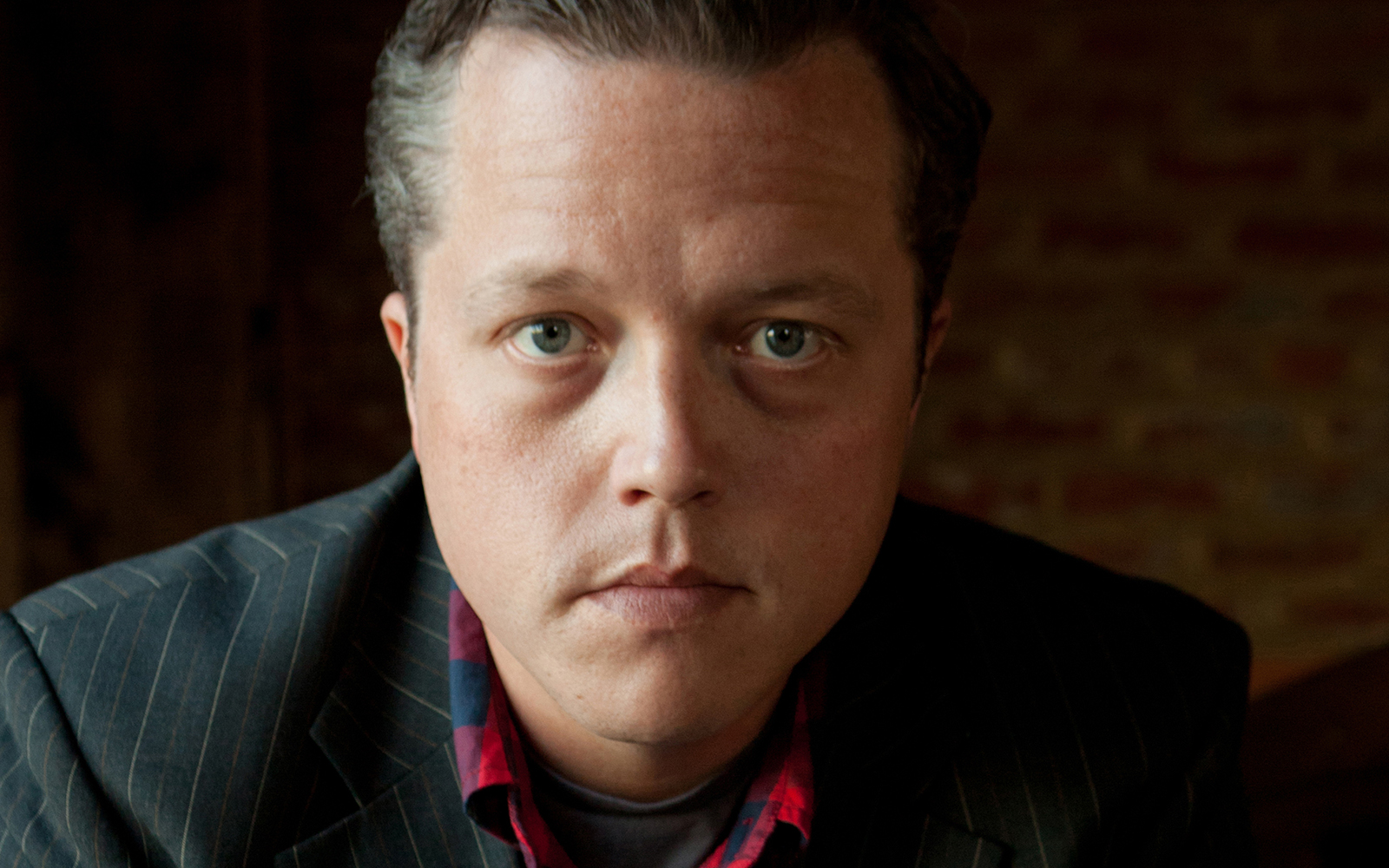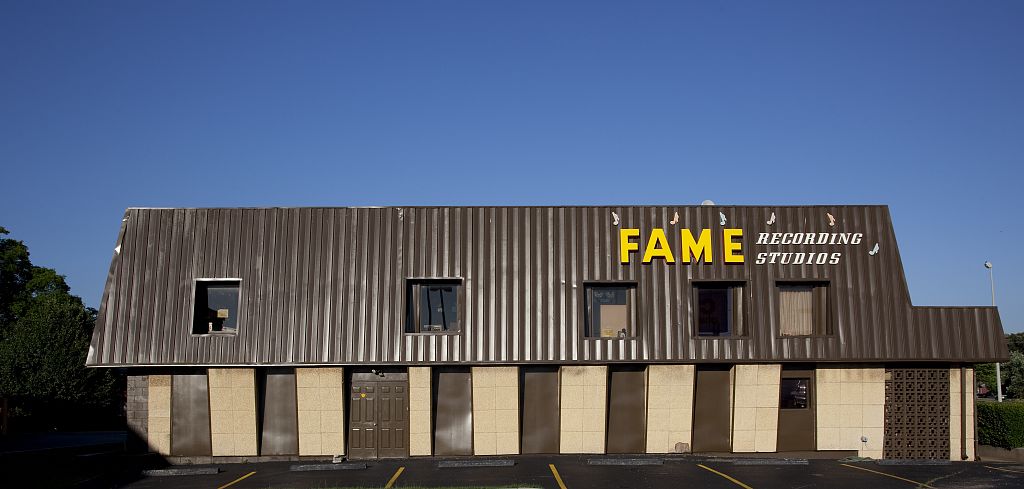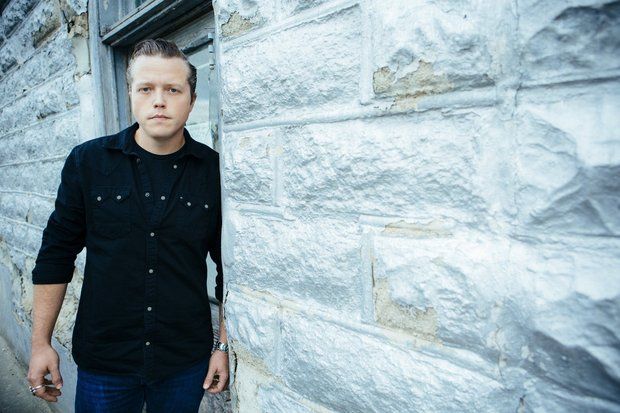Jason Isbell: A Hard-Wrought Freedom

It’s early afternoon on a late summer day and Jason Isbell has every right to be a bit anxious. The 36-year-old Green Hill, Ala., native will spend most of the day talking about his latest album Something More Than Free, and its seemingly improbable ascension to No. 1 on the Billboard Rock, Folk and Country charts. “I’m doing a lot of interviews today,” he says with a fair amount of reluctance in his voice. He’s clearly excited and happy to finally be what he calls “good busy,” but his heart is also with his wife and musical partner, Amanda Shires, who will give birth to their baby girl just a few days later on Sept. 1.
Isbell, an immensely talented singer, songwriter and guitarist, who also has the dubious distinction of being the rare musician to party too hard for even the Drive-By Truckers, is in the midst of both a creative renaissance and personal rebirth. His recent success has allowed him to truly step out of the spotlight of his former band for the first time in his sometimes-turbulent career, but it has also made him look back on his personal journey. As he humbly talks about his current rule over the alternative-country music world, he makes a point to trace his musical interests to his grandfather, an Alabama Pentecostal preacher.
“I spent a lot of my time with him, rather than any kind of day care,” he reflects. “He would teach me how to play guitar and mandolin. Usually, I’d play guitar and accompany him, and he would play fiddle or banjo or mandolin. That was his way of bonding with me, spending time with me and also keeping me out of trouble.”
Isbell speaks with a newfound sense of purpose, rarely wasting a single word. He recounts those days tinkering alongside his grandfather on more traditional acoustic instruments, and then jumps to his introduction to rock-and-roll music, thanks to his parents’ record bin.
“They are very young, comparatively,” he says of his mother and father, who are still in their mid-50s. “They were listening to a lot of arena rock and had a big record collection. When I was growing up, I listened to a lot of Queen and Cream, Bad Company.”
From the start, Isbell had the same type of hardworking, humble attitude that he brings to his craft today—playing local gigs around Alabama for $75 a night. He says he had “a little bit of local success,” but soon received the break that all songwriters dream of when FAME Recording Studios put him on retainer as a session musician and songwriter.

Isbell’s sound could be described as a swirl of rock, country and folk, sprinkled with a Muscle Shoals topping, and that final ingredient came during his time at FAME—the recording studio that welcomed Aretha Franklin, Wilson Pickett and Duane Allman. Isbell quit playing local gigs and dug into the FAME experience, all at the ripe age of 20 years old. As he says: “I grew up with that music as much as anything else.”
He recalls a story from FAME’s Rick Hall about Duane Allman camping out in the parking lot near the studio before being invited in to play on Wilson Pickett’s latest single. The conversation quickly skips to Isbell’s various Allman Brothers-related experiences. He talks about cleaning out a garage at FAME and finding pedals that belonged to Gregg and Duane Allman, as well as discovering backup copies to some of the Brothers’ recordings, both studio and live. Isbell also has an interesting take that he expands on during his appearance on Marc Maron’s WTF podcast—he doesn’t consider the Allmans to be “Southern rock.”
“When you say Southern rock, to me, that means Lynyrd Skynyrd,” he says confidently. Isbell notes that the Allmans are more improvisational, explaining, “The Allmans were trying to find something— they were on a bit of a musical journey, and that was really something that Southern rock didn’t necessarily embrace. That was more of an improvisational, sort of Grateful Dead influence.”
So how did the Allmans find that improvisational spirit deep in the heart of an area that didn’t necessarily embrace it?
“Mushrooms,” Isbell says with a laugh. “Magical mushrooms that grew out of cow shit in Macon, Ga. That’s how they found it.”
Isbell is known for such tangents, even when he is in the middle of promoting his own music. He is, as they say in the sports world, a “student of the game” with his ability to dig out stories, facts or other anecdotes about whatever band or genre you may be inquiring about. His knowledge of the music industry and music history is a large part of his story, and what makes him tick.
“The boozing started as soon as I got in the band with those guys,” Isbell reflects on his time in his first “real” band, Drive-By Truckers. After a spell at FAME, Isbell hooked up with Patterson Hood and the Truckers in 2001 at the impressionable age of 22. It was a tempting situation for a guy his age. Jack Daniel’s was the drink of choice for the Southern rockers, and Isbell fell victim to the rock-and-roll lifestyle, admitting that “it probably would have happened to just about anybody, to tell you the truth.” That isn’t an excuse as much as it is a fact.
To make matters worse, Isbell was married to then-bassist Shonna Tucker. After they divorced and remained in the group together, Isbell says his drinking and drug use “got heavy.” He adds, “It was a really difficult situation, day in and day out, so I drank way more than I should toward the end.”
In 2007, the Truckers fired Isbell, and his alcohol and drug addiction worsened. He released his first solo record, Sirens of the Ditch, but his personal problems persisted.
“There were terrible nights for me and everybody around me. I went to jail a few times, but where I grew up, that’s not a big deal.”
Isbell insists that there wasn’t a “rock bottom”-type moment, but rather a powerful realization that he had reasons to live. “It’s really hard for people to kick an addiction unless they feel it is necessary,” he explains, citing his now- wife Amanda Shires as a catalyst for his current state of sobriety.
“It became obvious that she depended on me and needed me to be in the world, and so did my parents and the people I made music with. I realized that gradually, and then finally decided that it was time to quit.”
Isbell is quick to point out that it took him years of self-destructive behavior to reach this awakening. He believes that the love shown by those close to him is what ultimately brought him to his senses. “When you see that, you say, ‘Well I guess I owe it to them to try to quit being an asshole, to try to get my shit together.’”
Contrary to most reports at the time, Isbell says there wasn’t really an intervention, but rather a push from Shires, his family members and his band, as well as another musician who recently completed his own quest to become sober—Ryan Adams. Isbell entered rehab at Cumberland Heights in Nashville in 2012, with one of his guitars in tow, and he would play in a practice room at the facility. “If you were a professional musician, you could go in there for an hour every week and play a guitar, and that was huge for me,” he explains.
When Isbell completed his program and sobered up, he quickly returned to the road and started playing music. Those first few tours, he says, were pivotal. Of note, he teamed up with Adams during the singer-songwriter’s first solo acoustic outing since he veered off the road to battle his Meniere’s disease in 2009. Isbell calls Adams a “really good influence” on him.
“He still seems like he’s really living a very rock-and-roll lifestyle, even though he’s not getting fucked up anymore,” Isbell explains. “For me to see that and see that you could still be an effective person and still get a lot of enjoyment out of your life without having to resort to alcohol was really important.”
Isbell admits that his run with Adams was a “trial by fire” since he hadn’t played a sober show since he was a teenager. He once again had to become a student of the game, soaking in everything Adams had to offer.
“How he explained it to me was: ‘If you’re having trouble out there when you’re by yourself in this big theater, just imagine that you’re playing to five people around you and make an imaginary circle,’” Isbell says. “It was hard for me to be onstage sober at first—that was really unnerving because all those nerves come back that you have been quieting with alcohol over the years, and you say, ‘Wow, do I really deserve to be up here?’ That was a difficult transition, but [Adams] had done it before, so he was really helpful.”
Along with the time on the road came a new record, Southeastern, one of Isbell’s most successful albums to date. Southeastern, which was released in 2013, is filled with stories from his rehab stint and the emotional and mental battle that comes with expelling an addiction like alcoholism. He also started turning out songs at a frantic pace.
“I know people who have real problems— people who can’t pay their bills, people who have sick kids or sick family members. I was going to sit here and complain about this, the pressure of ‘I’m having success, what do I do now?’ That’s bullshit. It’s bullshit. You keep writing and you keep working.”
Something More Than Free is the result of those songwriting sessions and, in certain ways, marks the culmination of his recovery period. Released this July, it quickly became both Isbell’s highest charting record ever and his most critically acclaimed. John Mayer referred to Isbell on Twitter as “the best lyric writer of my generation. He lives at a level where even great writers can only visit.” Todd Snider, a close friend of Isbell’s and the man who officiated his wedding to Shires, took it a step further, calling Something More Than Free‘s mainstream success a fatal blow against the “Nashville machine.”
“I can sell out four nights at the Ryman— me and Nashville are doing just fine,” Isbell says in response to those comments. “I will say that Music Row is probably a better descriptor for that,” he clarifies. “There are people that are trying to make money, and that’s their job. They’re not artists, but they call themselves recording artists, which I think is just a bullshit term.”

The Music Row Machine is still very much a real thing, something that Isbell calls “assembly line stuff.” He reluctantly says, “Honestly, I don’t like to call myself an artist. My wife tells me that I should, but there’s a big difference between an artist and a craftsman, and just because someone’s signed to Mercury doesn’t make them a goddamn artist. I don’t listen to those songs on the radio and I don’t enjoy those songs, and the older I get, the less hate-listening I do.”
Out of all the praise heaped on Isbell after the release of his new album—Ryan Adams also had kind words for him via social media—the one that sticks out to him is from his former Drive-By Truckers bandmate, Patterson Hood. “I’ve never been prouder of anyone in my life,” Hood wrote on Instagram.
“It means a lot coming from him,” Isbell notes. “A lot of people will say they’re proud of you when you do well—it always seems strange for people to say if they’ve had nothing to do with it. I’m not proud of people I don’t know because I didn’t help them out in any way, but Patterson has a right to say that about me and about Alabama Shakes, and about a lot of people that have been either inspired or helped out by him.”
Isbell also notes that he and Hood are “probably as close now as we were when I first joined the band.” In August, Isbell brought Hood out for the old Truckers numbers “Outfit” and “Never Gonna Change” during a show in his former bandmate’s current hometown of Portland, Ore.
Something More Than Free is definitive proof that Isbell has come to terms with his sobriety and newfound role as a family man. “I had a hell of a story to tell with Southeastern,” he notes. With the new record, Isbell sat back and assumed a more comfortable position, not just with his music, but also with himself.
“I felt like I had an opportunity and a responsibility to look outside myself and really try to represent the interests of people who are different from me, and try to empathize.”
The title track, specifically, draws from his father’s experiences. “I get a lot of inspiration from talking to my dad,” he says. “I’ve got a kid on the way, so I was asking my dad about that whole process. I grew up in church, but I’ve gotten away from it as I’ve gotten older, and I was asking my dad about the benefits of that. And he said, ‘I would go more if I could, but I work Monday through Saturday, and Sunday I’m just too tired to get up and go.’ I thought that that was a strange place to be in: You want to go be thankful for all the things that you have, but you’re too busy working every day to even go and be thankful in public.”
Jason Isbell has broken down and rebuilt nearly every aspect of his life during the past few years. He confronts the changes with a stunning humility and a commitment to his craft, never suggesting that he thought about quitting music while in rehab, and persevering with Southeastern and Something More Than Free.
As he sums up: “I’m trying to make something that isn’t easy to consume, that challenges people, something that opens itself up to multiple levels. And I don’t know if I’m always doing that, but that’s the kind of music that I like to listen to, so that’s the kind of music that I attempt to make. I don’t need more fans, I don’t need more money. Really, if I never get back to the top of an album chart, I’ll be perfectly fine with that as long as I get to keep making music that I think is honest and challenging to the audience.”



















